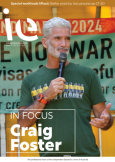International student crackdown
The federal government’s plans to limit and further regulate the international student sector remains the talk of the industry.
The controversial Education Services for Overseas Students Amendment Bill is almost certain to sail through parliament with the support of the Coalition.
The biggest changes have already been announced, particularly caps on the numbers of international students allowed at any given university and caps on some types of courses.
However, the course cap proposals have been watered down to the extent that only non-university and non-TAFE education providers will now to be subject to such limits.
Beyond the nuts and bolts of the changes, however, it does appear that a new era of bureaucratic control in higher education will soon be upon us.
Perhaps the most significant change being ushered in by the amendments is the greater control granted to the Immigration Minister of the day to set caps and rules.
There is definitely an argument that the international education sector needs a shake up, but as noted by Australian National University academic Andrew Norton, these and other changes “signal the demise of student choice and university autonomy”. Where this takes us is an open question.
Global context
Australia is not alone in looking to limit the growth of international student numbers.
In recent months, Canada announced a 10 per cent reduction in student visas granted for 2025, and this is on top of an already declining number of visas being granted in 2024.
Meanwhile, the UK has also pushed back against international student numbers over the past few years, to the point where student applications have declined by about 16 per cent in 2024.
It’s clear we are currently in an era in which some elements of the electorate are hostile to mass immigration. International students may well present the lowest hanging fruit for governments in terms of raw numbers as well as the potential political or economic blowback. In the age of Donald Trump and Peter Dutton, these anti-immigration pressures are probably not going away any time soon.
‘Dodgy college’ liability
So-called ‘dodgy colleges’ are a common rhetorical prop for those who seek to limit the international student sector, and it’s probably true that the lower end of the market provides some grist for that mill. However, a recent High Court decision should give some reassurance that time has run out for the less reputable operators.
The Australian Competition and Consumer Commission (ACCC) took Captain Cook College to court, alleging “systemic unconscionable conduct”.
The ACCC claimed the college enrolled students using dodgy inducements such as free laptops, and the college removed most student safeguards that would have otherwise allowed students to know what they were getting into.
The college also took advantage of government assistance (the former VET FEE-HELP), which meant that taxpayers ended up picking up the tab for courses that students were not completing, and in some cases couldn’t even access.
The Federal Court found in favour of the ACCC, and this was upheld by the High Court. Furthermore, the High Court found that the directors of the college were directly liable, as they should have known what was going on.
This means that directors will no longer be able to claim ignorance about unconscionable conduct by employees or agents – the buck stops there, after all – which will hopefully help weed out some of the bottom feeders that give the rest of the sector a bad name.











































































































































